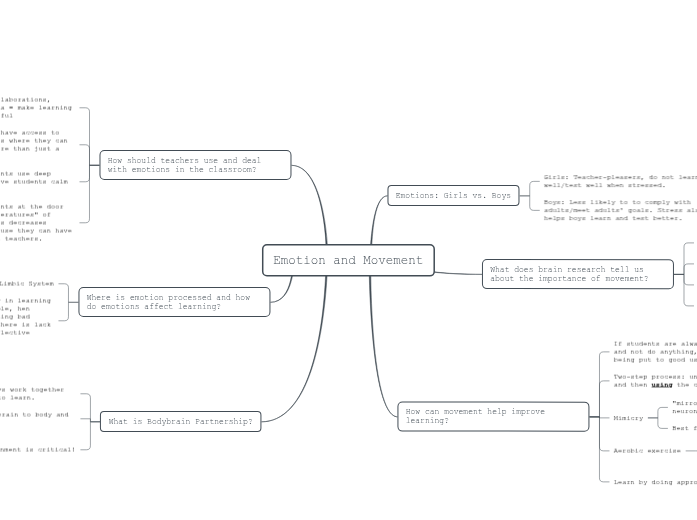Emotion and Movement
Emotions: Girls vs. Boys
Girls: Teacher-pleasers, do not learn well/test well when stressed.
Boys: Less likely to to comply with adults/meet adults' goals. Stress also helps boys learn and test better.
What does brain research tell us about the importance of movement?
Things that move require a brain.
Movement helps develop "higher" brain functions.
Being able to mimic is based on movement.
Aerobic exercise helps develop long-term memory
How can movement help improve learning?
If students are always told to sit down and not do anything, their brains are not being put to good use.
Two-step process: understanding content and then using the content.
Mimicry
"mirror neurons" = type of movement neurons
Best for learning a new language
Aerobic exercise
helps with forming new memories/kickstart the brain
Learn by doing approach
projects-based
field trips
How should teachers use and deal with emotions in the classroom?
Teaching strategies: collaborations, simulations, music, drama = make learning more memorable and powerful
Make sure that students have access to "being there" experiences where they can get sensory data from more than just a few sources.
When testing: Have students use deep breathing exercises = have students calm themselves
Teachers can greet students at the door and take "emotional temperatures" of individual students. This decreases anxiety in students because they can have short conversations with teachers.
Where is emotion processed and how do emotions affect learning?
Processed in the Limbic System
Emotions can cause difficulty in learning by causing anxiety. For example, hen feeling threatened (like getting bad grades), anxiety builds and there is lack of long-term learning and reflective learning.
What is Bodybrain Partnership?
The body and brain always work together in order for a student to learn.
Info is delivered from brain to body and body to brain.
Environment is critical!
No threats!
Need for Community!
